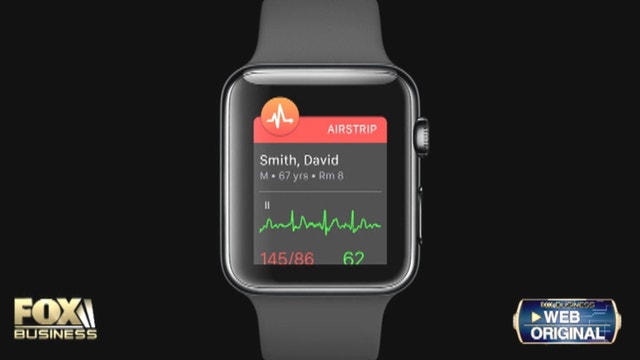How the Apple Watch Can Monitor Your Baby’s Heart Rate
Apple (NASDAQ:AAPL) products are part of our everyday lives, including the way we send texts, emails, videos and even watch TV. Now, the company is hoping to become part of your doctor visits too---and they’re targeting expecting mothers ---with the help of an app called Airstrip.
“The company started basically monitoring moms during labor and today, I think we monitor about 1 out of 6 babies in the United States,” says Alan Portela, CEO of AirStrip.
Airstrip launched about 11 years ago by mobilizing data from medical devices to send directly to your doctor on their mobile devices. It’s currently being used by 30,000 doctors in about 500 hospitals around the country.
“So far healthcare has been hospital-centric and now we’re moving into a patient-centric value base,” he adds. “What we are doing with Apple is taking our first shot at connecting with, in this case with obstetrics, to look at high risk pregnancies and be able to bring that use in the Apple Watch, iPhone and iPad.”
Portela says AirStrip works by using a number of body sensors that connect to your watch or iPhone via Bluetooth. Information on the baby's heart rate as well as maternal contractions is then sent to your doctor directly.
Peter Bernstein, MD, MPH, Director of Maternal Fetal Medicine at Montefiore Medical Center says he’s been using the app to enhance patient safety.
“If one of the doctors on the labor floor has a question or wants a second opinion about one of the fetal heart rates, they can give me a call and I can pull up the tracing on my phone whether I’m out to dinner or running errands and I can provide backup,” he says.
Before the app, Bernstein says he would either have to come to the hospital or have someone describe the heart rate tracings to him over the phone.
“These tracings are telling us about the status of the baby while it’s inside the mother and whether they’re getting into any sort of trouble,” he adds. “So this is critical for us for taking optimal care of our patients.”
The app is only currently available through doctors, but eventually, as the sensor technology grows, consumers will be able to buy these sensors and doctors will be able to download the app and look at their patients' vitals.
“A doctor can actually send a message to the mom to do a non-stress test at home,” says Portela.
The app is not only helping soon-to-be moms, but also heart attack patients. Anna Bortnick, Interventional Cardiologist at Montefiore says she’s been using the app to make quick decisions in emergency situations.
“This app is especially useful when everyone is at home in the middle of the night and we have to make a decision in about 5 minutes whether or not we are going to mobilize a whole team of doctors and nurses and perform a procedure,” she says.
Bortnick says there has been pressure to cut the response time from 90 minutes to 60 minutes from the time of first connect.
“Our goal right now is to get the artery open as fast as possible,” she says.
But her real hope is that the collaboration between Apple Watch and AirStrip will help raise awareness about heart disease.
“Patients can now identify when they’re having symptoms and maybe look at their watch to see if something is going on that they need to tell their doctor about.”




















